Overview
The article titled "10 Preguntas de la Ciudadania Every Immigrant Should Know" addresses the essential questions that immigrants need to be ready to answer during the citizenship process. It’s important to remember that understanding U.S. history, government structure, civic duties, and rights is crucial. This knowledge not only helps you navigate the citizenship application but also prepares you for the civics test, allowing you to demonstrate your understanding with confidence.
You may be feeling overwhelmed by the journey ahead, but know that you are not alone. Many immigrants share similar concerns, and being informed can make a significant difference. By familiarizing yourself with the naturalization process, you can approach this important step with clarity and assurance.
As you prepare for the civics test, consider reaching out for support. There are resources available that can guide you through this process, helping you feel more secure in your knowledge and abilities. Remember, every question you answer brings you one step closer to achieving your goal of citizenship. Take this opportunity to engage with your community and seek assistance when needed. You deserve to feel empowered on this journey.
Introduction
Navigating the path to U.S. citizenship can feel overwhelming, filled with complexities and uncertainties. Many immigrants face challenges in understanding the essential questions of citizenship, which not only prepares them for the naturalization test but also helps them forge a deeper connection to their new home. This article explores ten critical questions that every aspiring citizen should master. It offers insights into the rights, responsibilities, and historical context that shape American identity.
How familiar are you with these fundamental aspects of citizenship? Are you ready to embrace the opportunities that come with it?
Vasquez Law Firm: Expert Guidance for Your Citizenship Application Process
At Vasquez Law Firm, we understand the challenges you face in navigating the complexities of immigration law. With over 15 years of specialized experience, particularly in addressing preguntas de la ciudadania, we are here to help you every step of the way. Our personalized legal strategies ensure that all necessary documentation is meticulously prepared and submitted, significantly reducing the risk of delays or denials.
It's important to remember that recent updates from USCIS, including stricter reviews of disability exceptions and changes to the civics test effective in 2025, highlight the need for expert guidance regarding preguntas de la ciudadania in this evolving landscape. We are committed to advocating for your rights and ensuring you fully understand your options throughout the process. Our proven track record of success speaks to our dedication and expertise.
You may be feeling overwhelmed by the process, but our commitment not only assists you in steering clear of common traps but also prepares you to as you embrace your journey toward becoming an American citizen. We are here to support you, and together, we can navigate this path with confidence.
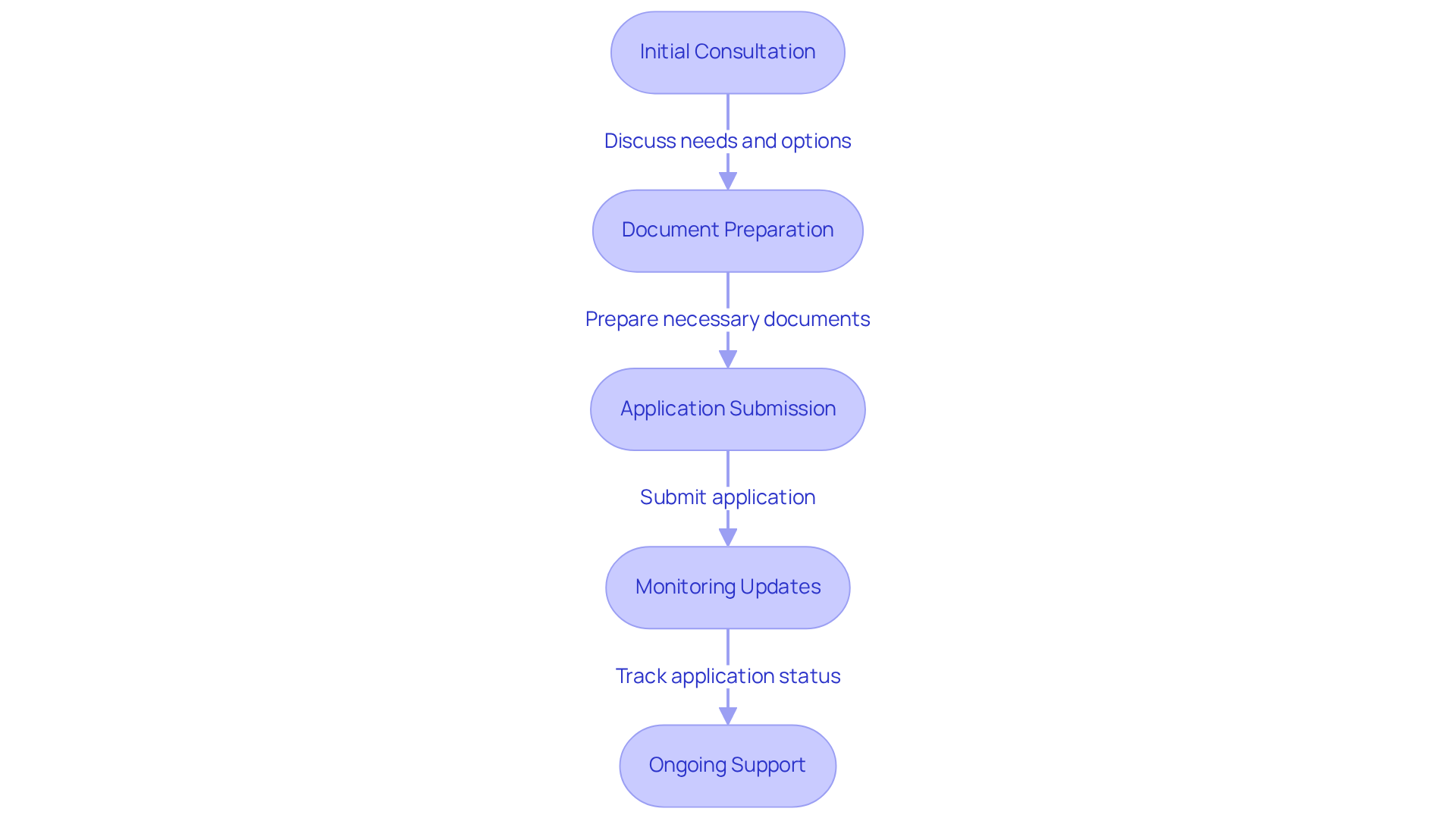
What is the Oath of Allegiance and Why is it Important?
The Oath of Allegiance is more than just a formal commitment; it represents a heartfelt promise made by individuals who are pursuing U.S. nationality. In this moment, they vow their loyalty to the United States while renouncing any allegiance to other countries. This significant Oath is taken during the naturalization ceremony, marking a crucial step in the journey to citizenship.
It's important to remember that this Oath signifies the applicant's deep commitment to uphold the Constitution and the laws of the United States. By taking this step, they embrace a vital component of becoming a citizen, paving the way for a future filled with opportunities and belonging. You may be feeling a mix of excitement and apprehension as you , and that’s completely natural.
As you reflect on this important commitment, know that you are not alone. Many have walked this path before you, and their stories often inspire hope and determination. The Oath of Allegiance is a powerful testament to the values of unity and dedication, making it a cherished milestone in the lives of new citizens.
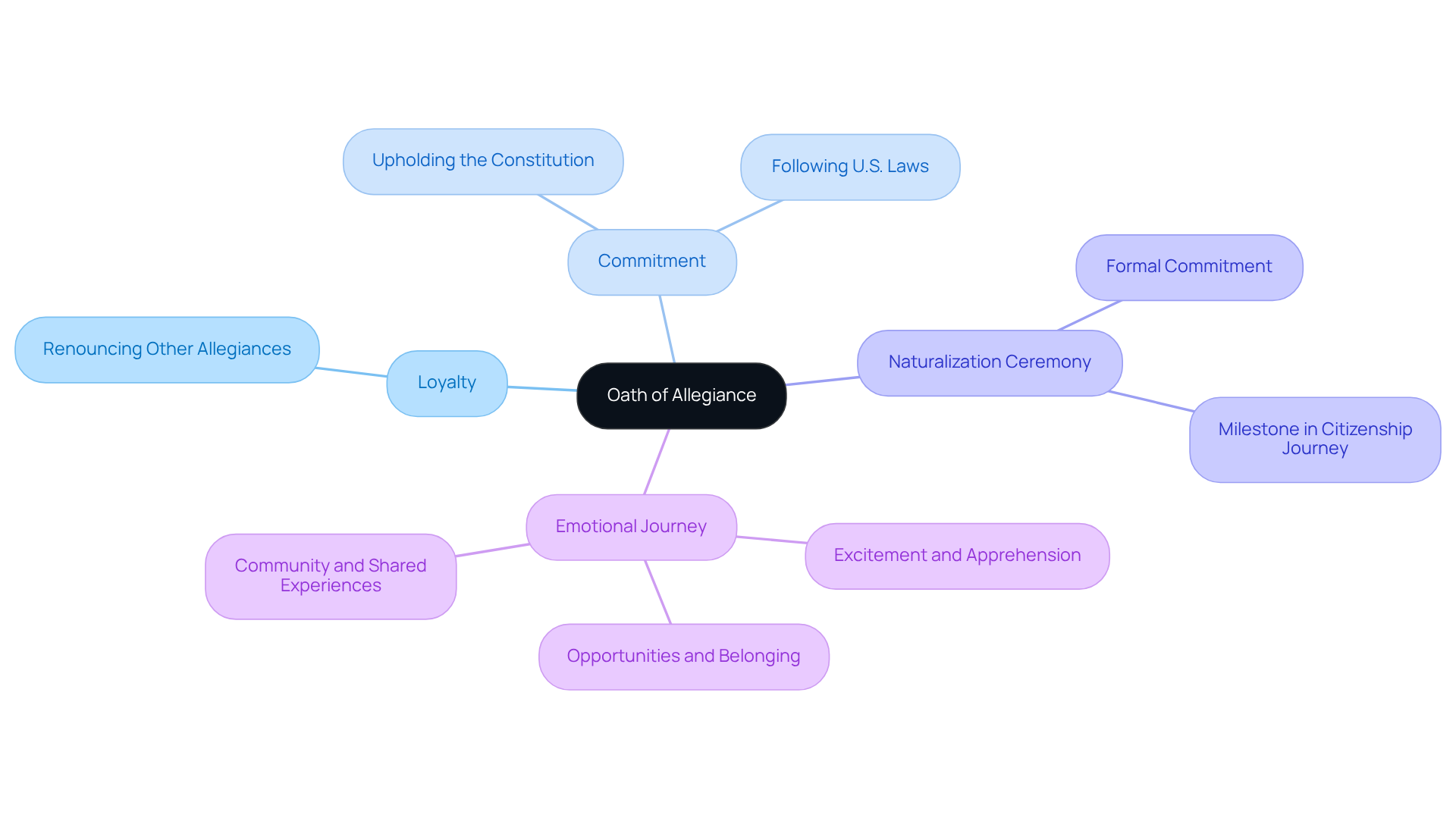
What Are the Rights and Responsibilities of U.S. Citizens?
As a U.S. citizen, you have the privilege of voting, enjoying freedom of speech, and accessing a fair trial. However, with these privileges come important responsibilities, such as:
- Obeying the law
- Paying taxes
- Serving on juries when called
It's important to remember that active participation in democracy is essential, and fulfilling these responsibilities is a vital part of being a citizen.
To help you navigate these responsibilities, the offers regular 'Know Your Rights' workshops in both English and Spanish. These workshops are designed to aid community members like you in understanding your legal entitlements in various situations. You may be feeling overwhelmed, but engaging in these initiatives can empower you and enhance your understanding of your rights and responsibilities.
Additionally, the firm provides annual scholarships for first-generation college students pursuing legal careers. This investment in the next generation of diverse legal professionals reflects a commitment to supporting your community. By participating in these programs, you can take meaningful steps toward understanding and exercising your rights as a new citizen.
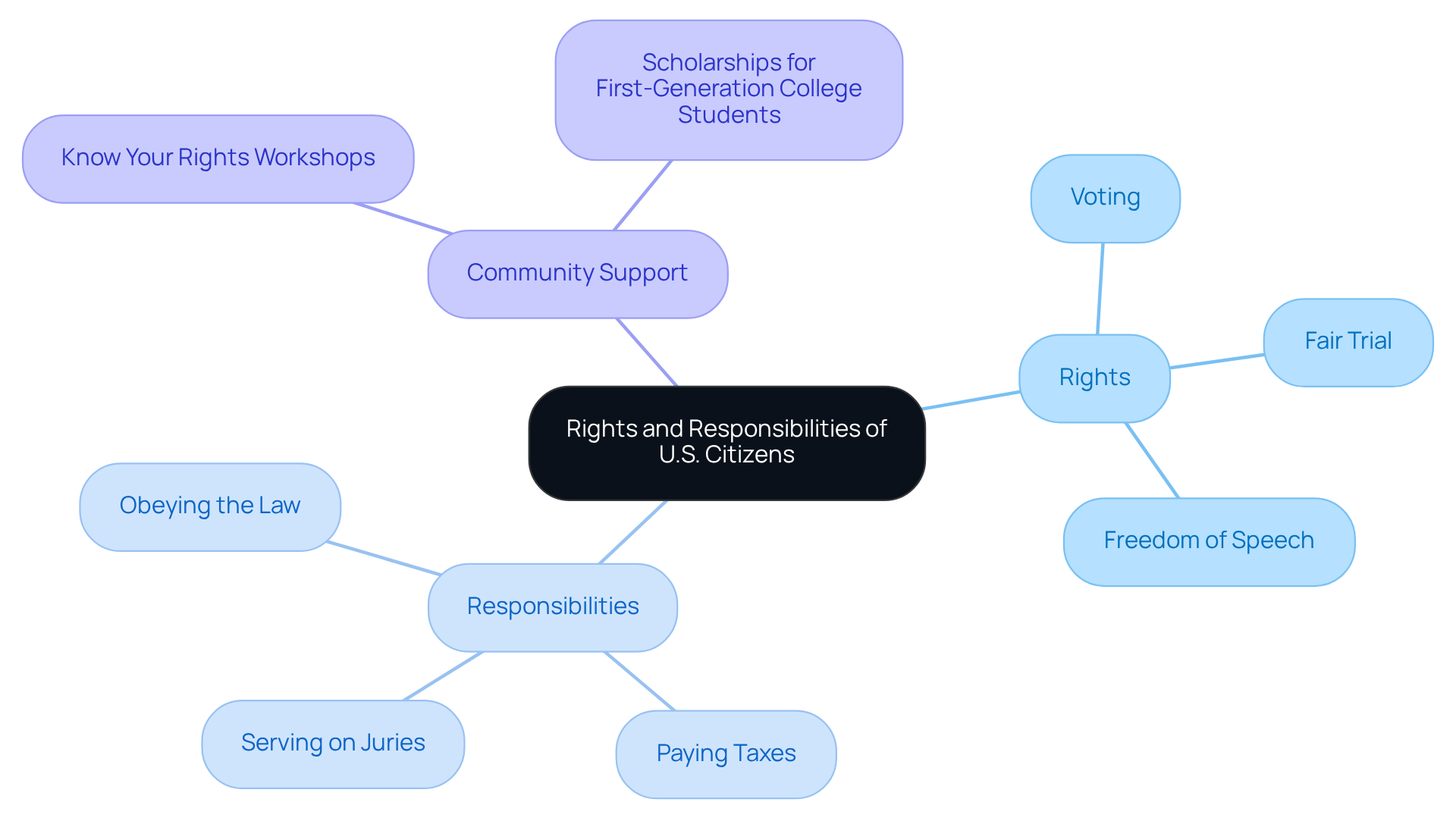
What Key Historical Events Should You Know for the Test?
As you embark on your journey toward naturalization, it's crucial to familiarize yourself with significant events like:
- The American Revolution
- The Civil War
- The Civil Rights Movement
Understanding these pivotal moments not only aids in succeeding in the naturalization assessment but also deepens your appreciation for American history and its lasting impact on our society today.
You might be wondering why this knowledge matters. Well, recognizing the contributions of key figures such as:
- George Washington
- Martin Luther King Jr.
can provide you with a richer perspective on the values that shape this nation. It's important to remember that these historical events and figures are not just facts; they are the foundation of the American identity, influencing the lives of many, including yours.
We encourage you to take the time to explore these topics. By doing so, you will not only prepare yourself for the assessment but also connect with the broader narrative of America. This journey is about understanding where you fit into this tapestry of history, and we are here to support you every step of the way.
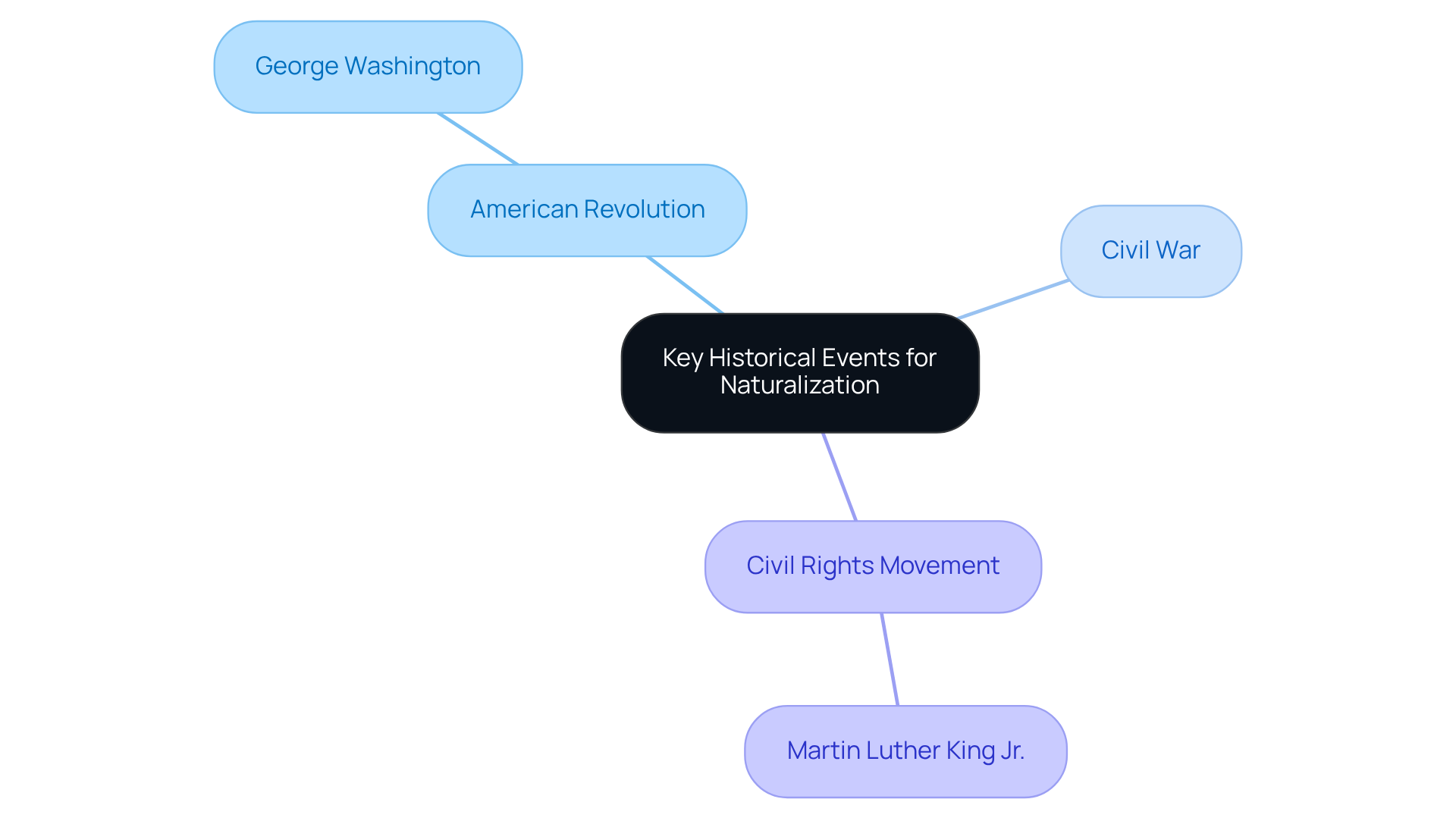
How is the U.S. Government Structured?
Understanding the structure of the U.S. government can be a pivotal step in your journey toward . It is divided into three branches: the legislative, executive, and judicial. The legislative branch, which consists of Congress, is responsible for making laws that impact everyday life. Have you ever wondered how these laws come to be? The executive branch, led by the President, is tasked with enforcing these laws, ensuring they are upheld fairly. Meanwhile, the judicial branch interprets these laws, safeguarding justice for all.
Grasping this structure is essential, as it forms the foundation of American democracy and governance. It’s important to remember that this knowledge not only empowers you but also connects you to the very fabric of the nation. By understanding how these branches work together, you can better navigate your path to answering preguntas de la ciudadania.
As you reflect on this information, consider how it relates to your own experiences and aspirations. This journey may feel overwhelming at times, but you are not alone. Seeking assistance and guidance can make a world of difference. Together, we can work toward your goal of citizenship by answering your preguntas de la ciudadania, ensuring you feel supported every step of the way.

What is the Naturalization Process and How Does it Work?
The naturalization process can feel overwhelming, but it is a structured journey that consists of several key steps:
- Determining eligibility
- Completing the N-400 application
- Attending a biometrics appointment
- Participating in the naturalization interview and examination
As you look ahead to 2025, it’s important to prepare for the updated civics test by USCIS, which includes preguntas de la ciudadania. This test aims to better assess your , which is essential for answering preguntas de la ciudadania successfully.
You may be feeling anxious about this process, but remember that applicants must not only demonstrate their knowledge but also exhibit proficiency in reading, writing, and speaking English. Familiarity with each step is crucial, as it empowers you to prepare thoroughly, enhancing your chances of a successful outcome. Statistics suggest that grasping the process can greatly boost success rates; for instance, individuals who engage in thorough preparation have shown a success rate exceeding 90%.
As immigration attorney Camilo Montoya-Galvez wisely states, 'Preparation is key to navigating the complexities of the naturalization process.' Many successful naturalization stories further highlight the importance of thorough preparation. These stories showcase how applicants who diligently study and practice have achieved their citizenship goals. You are not alone in this journey; with the right preparation and support, you too can reach your citizenship aspirations.
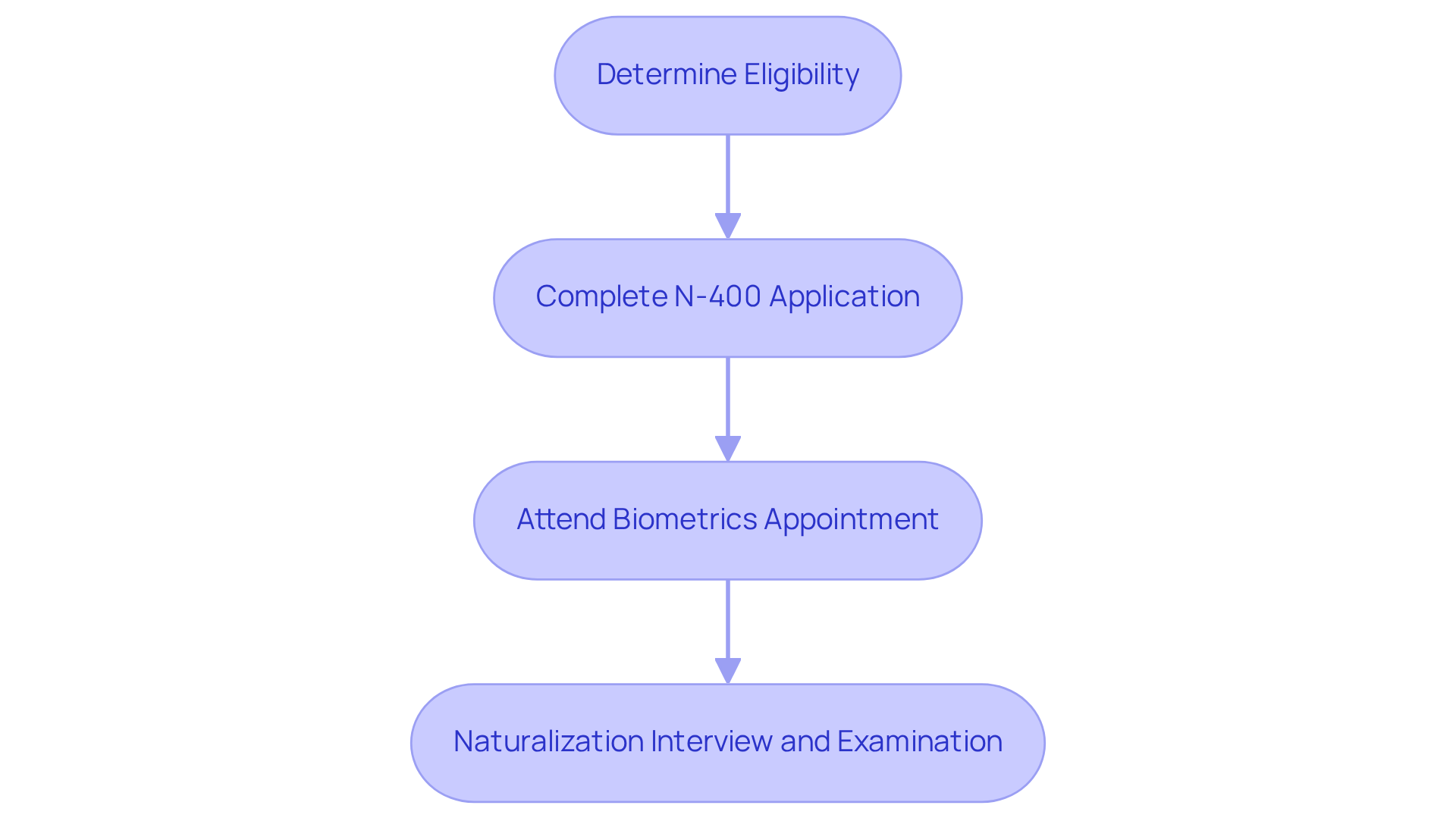
What Civic Duties Must Citizens Fulfill?
Civic duties are vital for our community and include:
- Voting in elections
- Serving on juries
- Participating in community service
It's important to remember that as citizens, we are expected to stay informed about both local and national matters and to honor the privileges of others. Fulfilling these responsibilities is essential for maintaining a healthy democracy, ensuring that every voice is heard in the political process.
At Vasquez Law Firm, we deeply understand the significance of civic involvement. Through our 'Know Your Rights' workshops, we aim to inform community members about their legal entitlements in various situations. You may be feeling uncertain about your rights, but we are here to help empower you with knowledge. Additionally, our annual scholarships for first-generation college students pursuing legal careers reflect our commitment to nurturing future legal professionals who will contribute to a more informed and engaged citizenry.
Together, let’s embrace our civic responsibilities and support one another in creating a vibrant community. Your , and we are here to guide you every step of the way.
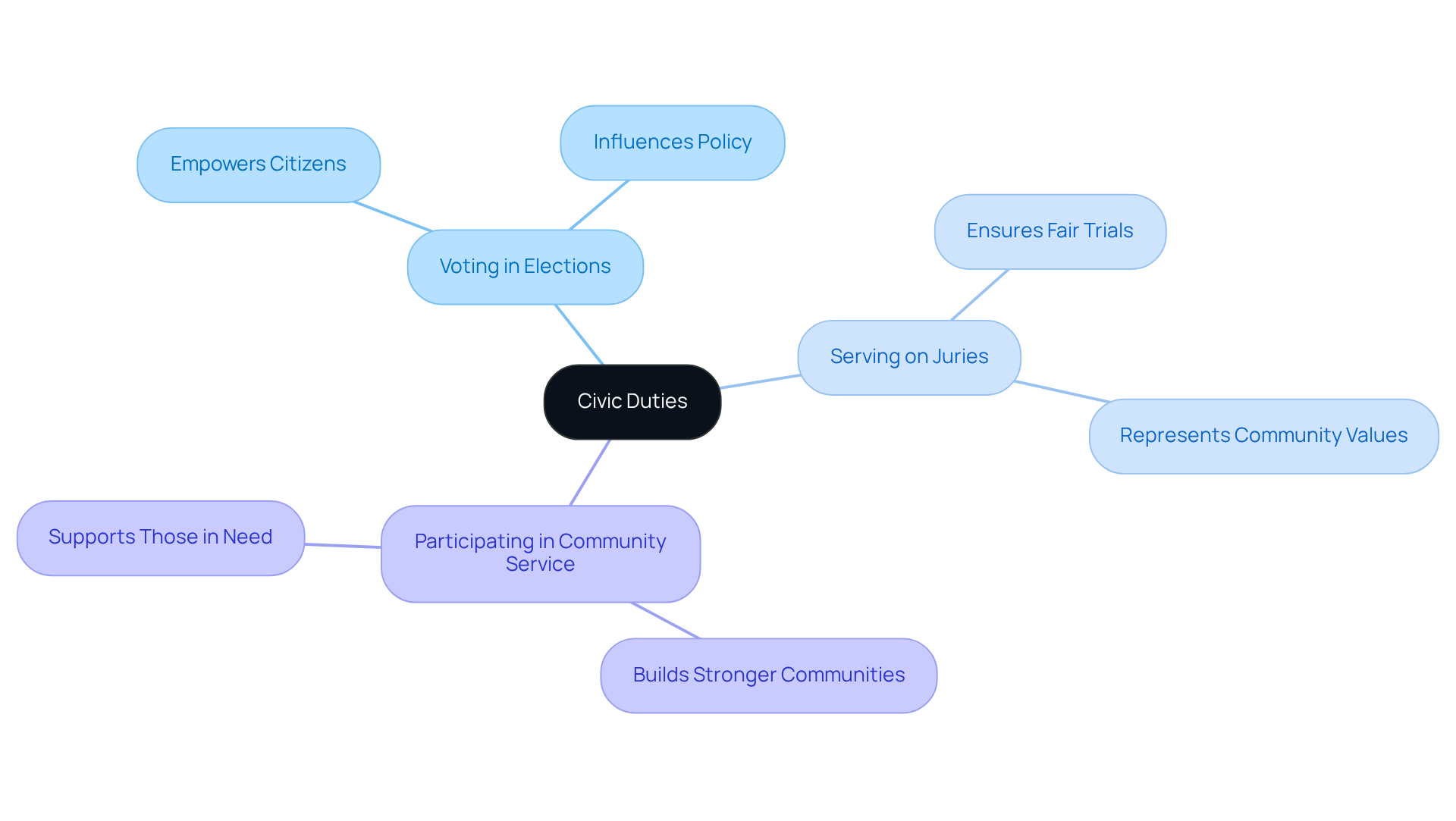
What Are the National Symbols and Holidays of the United States?
National symbols, such as the American flag, the bald eagle, and the national anthem, 'The Star-Spangled Banner,' hold a special place in the hearts of many. Important holidays like Independence Day, Thanksgiving, and Memorial Day not only celebrate our history but also reflect the core values of our nation.
It's important to remember that understanding the , along with these symbols and holidays, can foster a profound sense of belonging and pride, especially for new citizens navigating their journey. By embracing these elements, individuals can connect more deeply with the community around them.
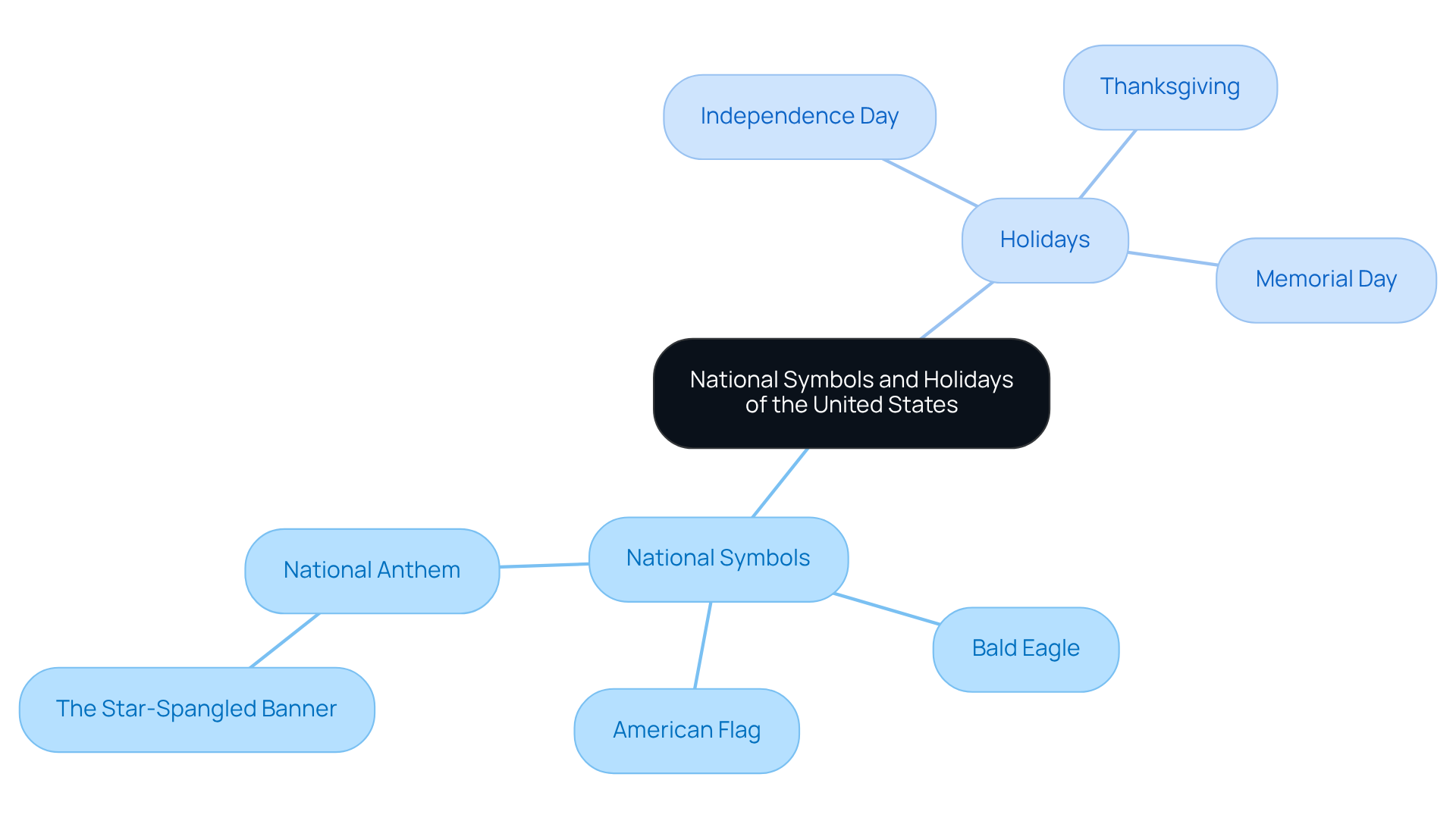
Why is the Constitution Important for U.S. Citizens?
The Constitution stands as the highest legal authority of our nation, shaping the framework for governance and protecting the freedoms we hold dear. It embodies the principles of democracy, including checks and balances, and enshrines essential rights through the Bill of Rights. For new citizens, understanding the Constitution is not just important—it's empowering. It equips you to advocate for your rights and engage fully in civic life.
It's important to remember that navigating these concepts can be challenging. Many may feel overwhelmed or uncertain about where to begin. But know that you are not alone in this journey. Embracing the Constitution allows you to take an active role in your community and assert your voice.
As you learn and grow, consider how these principles can guide your actions and decisions. Engaging with the Constitution fosters a sense of belonging and purpose. We encourage you to explore these ideas further and connect with others who share your passion for civic involvement. Together, we can build a brighter future.
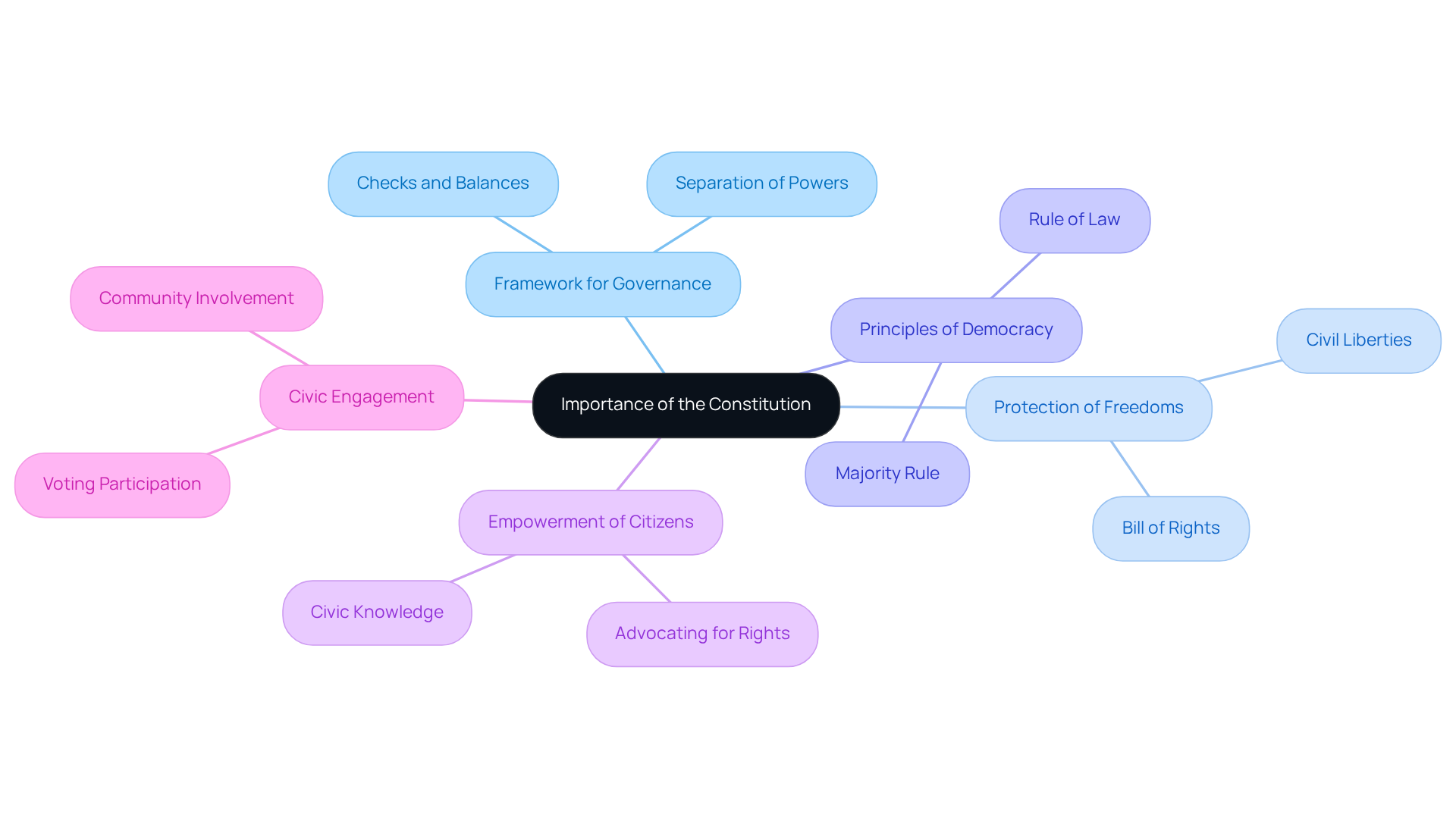
Where to Find Study Resources for the Citizenship Test?
If you're preparing for the naturalization examination, it's comforting to know that preguntas de la ciudadania and a wealth of resources are at your fingertips. The USCIS website serves as a primary resource, offering like flashcards and practice quizzes that cover essential temas de preguntas de la ciudadania. You might find that local libraries and community organizations, including the American Immigration Lawyers Association and local immigrant support groups, often host naturalization classes and study groups. These structured learning environments can provide the support you need.
For those who prefer online learning, many platforms offer interactive courses and quizzes specifically designed for preguntas de la ciudadania. This makes your preparation not only accessible but also engaging. It's important to remember that recent trends show over 92% of candidates passed the civics section of the test on their first try in FY 2022. This reflects a positive shift towards digital learning methods in citizenship preparation.
Additionally, approximately 11.6% of applicants qualified for an English language exception, highlighting the diverse needs of applicants. By utilizing the resources available to you, you're taking a vital step towards achieving your goals. Remember, you're not alone in this journey—there are many who have walked this path before you, and support is readily available.

Conclusion
Navigating the path to U.S. citizenship can indeed be a complex journey, filled with important knowledge and responsibilities. It's essential to understand key elements such as the Oath of Allegiance, the rights and responsibilities of citizens, and the historical context of American democracy. Each aspect discussed throughout this article reinforces the significance of being well-prepared and informed as you approach the naturalization process.
Key insights reveal the structured nature of the citizenship application, the importance of engaging with civic duties, and the resources available for study and support. From grasping the foundational principles enshrined in the Constitution to recognizing the pivotal historical events that shaped our nation, every piece of knowledge contributes to a deeper connection to American identity and values. Organizations like Vasquez Law Firm play a vital role, providing invaluable assistance to ensure that applicants can navigate these complexities with confidence.
Ultimately, embracing the journey toward citizenship is not merely about passing a test; it's about becoming an active participant in a vibrant democracy. Engaging with your community, understanding civic responsibilities, and preparing thoroughly can empower you to fulfill your aspirations. As new citizens step forward, they not only honor their commitment to the United States but also enrich the fabric of the nation with their unique stories and contributions. Remember, you are not alone on this journey; support is available, and your aspirations matter.
Frequently Asked Questions
What services does Vasquez Law Firm provide for citizenship applications?
Vasquez Law Firm offers expert guidance in navigating the complexities of immigration law, with personalized legal strategies to ensure all necessary documentation is prepared and submitted, reducing the risk of delays or denials.
Why is it important to have expert guidance for citizenship applications?
Recent updates from USCIS, including stricter reviews of disability exceptions and changes to the civics test effective in 2025, highlight the need for expert guidance to navigate the evolving landscape of immigration law.
What is the Oath of Allegiance?
The Oath of Allegiance is a formal commitment made by individuals pursuing U.S. nationality, where they vow loyalty to the United States and renounce allegiance to other countries. It is taken during the naturalization ceremony.
Why is the Oath of Allegiance significant?
The Oath signifies the applicant's commitment to uphold the Constitution and laws of the United States, representing a crucial step in their journey to citizenship and paving the way for future opportunities.
What are the rights of U.S. citizens?
U.S. citizens have the rights to vote, enjoy freedom of speech, and access a fair trial.
What responsibilities do U.S. citizens have?
Responsibilities of U.S. citizens include obeying the law, paying taxes, and serving on juries when called.
How does Vasquez Law Firm support community members in understanding their rights?
The firm conducts regular 'Know Your Rights' workshops in both English and Spanish to help community members understand their legal entitlements.
Does Vasquez Law Firm offer any programs for students?
Yes, the firm provides annual scholarships for first-generation college students pursuing legal careers, reflecting its commitment to supporting the community.




